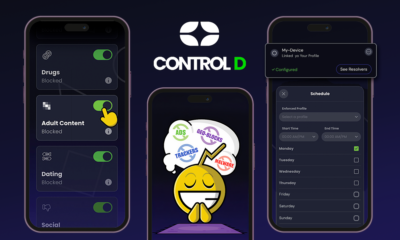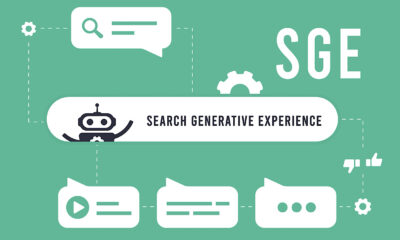TECHNOLOGY
10 Industries Riding the Wave of AI Disruption

Like a science fiction novel, artificial intelligence (AI) is ready to disrupt how many industries operate in the 21st century.
For some of these industries, the advantages of AI are a boon. For others, the changes might be a hindrance. Whether a company can adapt to this new technology might make or break them. Here are ten industries disrupted by AI.
1. Healthcare
One of the most critical industries that AI disrupts is healthcare. The applications of AI and machine learning programs are what allowed the healthcare industry to meet the rapidly increasing needs of people during the COVID-19 pandemic.
While most people think of healthcare as doctors and medical science, many administrative duties go on behind the scenes. Scheduling, filing insurance, and medical reports are the backbone of hospitals and healthcare facilities. That’s where AI comes in. Automating processes such as filing insurance, taking patient calls, and helping scheduling tasks can free nurses and healthcare staff to use their time on more pressing matters, such as taking care of patients.
Artificial intelligence has also made contributions to medical labs. Automating much of the testing process has allowed laboratories to keep up with the need for testing despite a staff shortage. Ensuring that tests are done on time ensures patients get the care they need as quickly as possible.
2. Manufacturing
Another industry disrupted by AI is manufacturing. Over the past several years, manufacturing has shifted towards automation using computer and robotics technology. These machines perform mundane but essential tasks, such as assembly and management.
The use of robotics technology makes the manufacturing process more efficient. One application of AI is learning how to perform repetitive tasks as quickly as possible. AI uses formulas and templates to perform necessary functions. Some tasks, such as gage calibration, are essential yet mundane — something that artificial intelligence can perform effortlessly, compared to humans who may become restless or bored.
Combined with robotics technology, AI can perform repetitive tasks better and with fewer mistakes than humans. This is a game changer in the manufacturing industry, where repetitive processes are common. In addition to bearing some of the workload, AI machines can also keep workers safe by taking on more dangerous tasks.
3. Weather Prediction
AI is also making strides in meteorology, specifically the ability to make weather forecasts. Predicting the weather involves a lot of computational power from many scanning devices worldwide. Even with the power of supercomputers, the ability to predict the weather is limited as forecasts degrade the further into the future you go.
Artificial intelligence and machine learning can make weather prediction more accurate and more efficient. Satellites are constantly sending new data to supercomputers, making it arduous to sift through it all. AI’s ability to handle large data sets makes it perfect for this task — compiling reports of all the data collected for users to read.
Machine learning takes this capability a step further by making predictions based on the data collected without human input. This feature allows for accurate predictions further into the future than ever before.
4. Customer Service
As AI chat programs like ChatGPT become more sophisticated, people-facing industries like customer service are adopting them to help fulfill more tasks. Automated calls and answering robots can remove much of the burden from human representatives by completing mundane tasks and answering frequently asked questions.
AI programs can even guide customers through several processes, such as making payments and changes to their accounts. This capability allows representatives to use their time helping customers with genuinely pressing issues and personalized assistance.
5. Advertising and Marketing
AI and machine learning applications are even making their way into the advertising and marketing industries. The key to any successful marketing strategy is to have the correct data to fulfill the company’s purposes. Artificial intelligence can make gathering that data faster and more efficient than ever.
AI tools can be used to launch surveys and observe a target market’s interests so companies can properly plan their advertising campaigns. AI can even help design advertising materials, such as signs and containers, based on trends the target audience is interested in.
6. Finance
The financial sector is another industry disrupted by AI. Many banks and other financial institutions were deeply affected by the COVID-19 pandemic. When people could no longer visit these places, they turned to digital banking to manage their finances.
Digital banking continues to be the preferred method for people to work on their finances. AI applications make managing money from anywhere a much simpler affair. Chatbot programs and voice assistants can guide consumers to the solution to any problem they might face.
In addition to proving convenience, AI has made digital banking more secure by tightening cybersecurity — ensuring that hackers and viruses stay out of people’s bank accounts.
7. Cybersecurity
Artificial intelligence isn’t just raising cybersecurity for banks. As the world becomes more reliant on digital technology, the rate of cyber attacks on businesses and individuals has also skyrocketed. New cybersecurity tools powered by machine learning have emerged to combat these ever-growing threats.
These tools can perform analysis of the newest and most common cybersecurity threats and scan internet traffic for them — destroying malicious programs before they can enter the system. Machine learning allows for more accurate threat detection and can even automate tasks such as alert response and reports.
8. Logistics
As worldwide events such as the conflict in Ukraine create difficulties in the global supply chain, the applications of AI have become important to keeping logistics on track on a local and international scale. Artificial intelligence can allow greater interaction between companies, ensuring that all parties involved in logistics are kept informed of each other’s activities.
Being aware of any disruptions in the supply chain allows companies to adjust their expectations and make plans to minimize the impact of said disruptions. It can also streamline the travel process and give greater insight into the status of goods traveling from long distances.
9. Retail
New applications of AI are also disrupting the retail sector. Digital tools are becoming the standard for retail management. Tasks such as inventory management and payment processing can be automated using artificial intelligence — making it easier for companies to retain employees and make business processes more efficient.
10. Lifestyle
Finally, artificial intelligence technology has become a facet of everyday life. AI operates on every level of the modern home, from personal computers to voice assistants like Alexa and Siri. As digital technology advances, machine learning will play an even bigger part in everyday life.
Self-driving cars and buses, more accurate GPS and virtual hobbies are all poised to become big industries in the near future. Meanwhile, voice assistants are growing more sophisticated as machine learning continues to evolve.
AI Is the Future of Every Industry
Artificial intelligence was once thought of as something you could only find in a sci-fi novel. Now, it has become a fact of life. AI and machine learning have made places for themselves in every industry — and they’re here to stay.
TECHNOLOGY
Next-gen chips, Amazon Q, and speedy S3

AWS re:Invent, which has been taking place from November 27 and runs to December 1, has had its usual plethora of announcements: a total of 21 at time of print.
Perhaps not surprisingly, given the huge potential impact of generative AI – ChatGPT officially turns one year old today – a lot of focus has been on the AI side for AWS’ announcements, including a major partnership inked with NVIDIA across infrastructure, software, and services.
Yet there has been plenty more announced at the Las Vegas jamboree besides. Here, CloudTech rounds up the best of the rest:
Next-generation chips
This was the other major AI-focused announcement at re:Invent: the launch of two new chips, AWS Graviton4 and AWS Trainium2, for training and running AI and machine learning (ML) models, among other customer workloads. Graviton4 shapes up against its predecessor with 30% better compute performance, 50% more cores and 75% more memory bandwidth, while Trainium2 delivers up to four times faster training than before and will be able to be deployed in EC2 UltraClusters of up to 100,000 chips.
The EC2 UltraClusters are designed to ‘deliver the highest performance, most energy efficient AI model training infrastructure in the cloud’, as AWS puts it. With it, customers will be able to train large language models in ‘a fraction of the time’, as well as double energy efficiency.
As ever, AWS offers customers who are already utilising these tools. Databricks, Epic and SAP are among the companies cited as using the new AWS-designed chips.
Zero-ETL integrations
AWS announced new Amazon Aurora PostgreSQL, Amazon DynamoDB, and Amazon Relational Database Services (Amazon RDS) for MySQL integrations with Amazon Redshift, AWS’ cloud data warehouse. The zero-ETL integrations – eliminating the need to build ETL (extract, transform, load) data pipelines – make it easier to connect and analyse transactional data across various relational and non-relational databases in Amazon Redshift.
A simple example of how zero-ETL functions can be seen is in a hypothetical company which stores transactional data – time of transaction, items bought, where the transaction occurred – in a relational database, but use another analytics tool to analyse data in a non-relational database. To connect it all up, companies would previously have to construct ETL data pipelines which are a time and money sink.
The latest integrations “build on AWS’s zero-ETL foundation… so customers can quickly and easily connect all of their data, no matter where it lives,” the company said.
Amazon S3 Express One Zone
AWS announced the general availability of Amazon S3 Express One Zone, a new storage class purpose-built for customers’ most frequently-accessed data. Data access speed is up to 10 times faster and request costs up to 50% lower than standard S3. Companies can also opt to collocate their Amazon S3 Express One Zone data in the same availability zone as their compute resources.
Companies and partners who are using Amazon S3 Express One Zone include ChaosSearch, Cloudera, and Pinterest.
Amazon Q
A new product, and an interesting pivot, again with generative AI at its core. Amazon Q was announced as a ‘new type of generative AI-powered assistant’ which can be tailored to a customer’s business. “Customers can get fast, relevant answers to pressing questions, generate content, and take actions – all informed by a customer’s information repositories, code, and enterprise systems,” AWS added. The service also can assist companies building on AWS, as well as companies using AWS applications for business intelligence, contact centres, and supply chain management.
Customers cited as early adopters include Accenture, BMW and Wunderkind.
Want to learn more about cybersecurity and the cloud from industry leaders? Check out Cyber Security & Cloud Expo taking place in Amsterdam, California, and London. Explore other upcoming enterprise technology events and webinars powered by TechForge here.
TECHNOLOGY
HCLTech and Cisco create collaborative hybrid workplaces

Digital comms specialist Cisco and global tech firm HCLTech have teamed up to launch Meeting-Rooms-as-a-Service (MRaaS).
Available on a subscription model, this solution modernises legacy meeting rooms and enables users to join meetings from any meeting solution provider using Webex devices.
The MRaaS solution helps enterprises simplify the design, implementation and maintenance of integrated meeting rooms, enabling seamless collaboration for their globally distributed hybrid workforces.
Rakshit Ghura, senior VP and Global head of digital workplace services, HCLTech, said: “MRaaS combines our consulting and managed services expertise with Cisco’s proficiency in Webex devices to change the way employees conceptualise, organise and interact in a collaborative environment for a modern hybrid work model.
“The common vision of our partnership is to elevate the collaboration experience at work and drive productivity through modern meeting rooms.”
Alexandra Zagury, VP of partner managed and as-a-Service Sales at Cisco, said: “Our partnership with HCLTech helps our clients transform their offices through cost-effective managed services that support the ongoing evolution of workspaces.
“As we reimagine the modern office, we are making it easier to support collaboration and productivity among workers, whether they are in the office or elsewhere.”
Cisco’s Webex collaboration devices harness the power of artificial intelligence to offer intuitive, seamless collaboration experiences, enabling meeting rooms with smart features such as meeting zones, intelligent people framing, optimised attendee audio and background noise removal, among others.
Want to learn more about cybersecurity and the cloud from industry leaders? Check out Cyber Security & Cloud Expo taking place in Amsterdam, California, and London. Explore other upcoming enterprise technology events and webinars powered by TechForge here.
TECHNOLOGY
Canonical releases low-touch private cloud MicroCloud

Canonical has announced the general availability of MicroCloud, a low-touch, open source cloud solution. MicroCloud is part of Canonical’s growing cloud infrastructure portfolio.
It is purpose-built for scalable clusters and edge deployments for all types of enterprises. It is designed with simplicity, security and automation in mind, minimising the time and effort to both deploy and maintain it. Conveniently, enterprise support for MicroCloud is offered as part of Canonical’s Ubuntu Pro subscription, with several support tiers available, and priced per node.
MicroClouds are optimised for repeatable and reliable remote deployments. A single command initiates the orchestration and clustering of various components with minimal involvement by the user, resulting in a fully functional cloud within minutes. This simplified deployment process significantly reduces the barrier to entry, putting a production-grade cloud at everyone’s fingertips.
Juan Manuel Ventura, head of architectures & technologies at Spindox, said: “Cloud computing is not only about technology, it’s the beating heart of any modern industrial transformation, driving agility and innovation. Our mission is to provide our customers with the most effective ways to innovate and bring value; having a complexity-free cloud infrastructure is one important piece of that puzzle. With MicroCloud, the focus shifts away from struggling with cloud operations to solving real business challenges” says
In addition to seamless deployment, MicroCloud prioritises security and ease of maintenance. All MicroCloud components are built with strict confinement for increased security, with over-the-air transactional updates that preserve data and roll back on errors automatically. Upgrades to newer versions are handled automatically and without downtime, with the mechanisms to hold or schedule them as needed.
With this approach, MicroCloud caters to both on-premise clouds but also edge deployments at remote locations, allowing organisations to use the same infrastructure primitives and services wherever they are needed. It is suitable for business-in-branch office locations or industrial use inside a factory, as well as distributed locations where the focus is on replicability and unattended operations.
Cedric Gegout, VP of product at Canonical, said: “As data becomes more distributed, the infrastructure has to follow. Cloud computing is now distributed, spanning across data centres, far and near edge computing appliances. MicroCloud is our answer to that.
“By packaging known infrastructure primitives in a portable and unattended way, we are delivering a simpler, more prescriptive cloud experience that makes zero-ops a reality for many Industries.“
MicroCloud’s lightweight architecture makes it usable on both commodity and high-end hardware, with several ways to further reduce its footprint depending on your workload needs. In addition to the standard Ubuntu Server or Desktop, MicroClouds can be run on Ubuntu Core – a lightweight OS optimised for the edge. With Ubuntu Core, MicroClouds are a perfect solution for far-edge locations with limited computing capabilities. Users can choose to run their workloads using Kubernetes or via system containers. System containers based on LXD behave similarly to traditional VMs but consume fewer resources while providing bare-metal performance.
Coupled with Canonical’s Ubuntu Pro + Support subscription, MicroCloud users can benefit from an enterprise-grade open source cloud solution that is fully supported and with better economics. An Ubuntu Pro subscription offers security maintenance for the broadest collection of open-source software available from a single vendor today. It covers over 30k packages with a consistent security maintenance commitment, and additional features such as kernel livepatch, systems management at scale, certified compliance and hardening profiles enabling easy adoption for enterprises. With per-node pricing and no hidden fees, customers can rest assured that their environment is secure and supported without the expensive price tag typically associated with cloud solutions.
Want to learn more about cybersecurity and the cloud from industry leaders? Check out Cyber Security & Cloud Expo taking place in Amsterdam, California, and London. Explore other upcoming enterprise technology events and webinars powered by TechForge here.
-

 PPC4 days ago
PPC4 days ago19 Best SEO Tools in 2024 (For Every Use Case)
-
SEARCHENGINES7 days ago
Daily Search Forum Recap: April 16, 2024
-

 SEO7 days ago
SEO7 days agoGoogle Clarifies Vacation Rental Structured Data
-

 MARKETING6 days ago
MARKETING6 days agoStreamlining Processes for Increased Efficiency and Results
-
SEARCHENGINES6 days ago
Daily Search Forum Recap: April 17, 2024
-

 SEO6 days ago
SEO6 days agoAn In-Depth Guide And Best Practices For Mobile SEO
-

 PPC6 days ago
PPC6 days ago97 Marvelous May Content Ideas for Blog Posts, Videos, & More
-
SEARCHENGINES5 days ago
Daily Search Forum Recap: April 18, 2024














